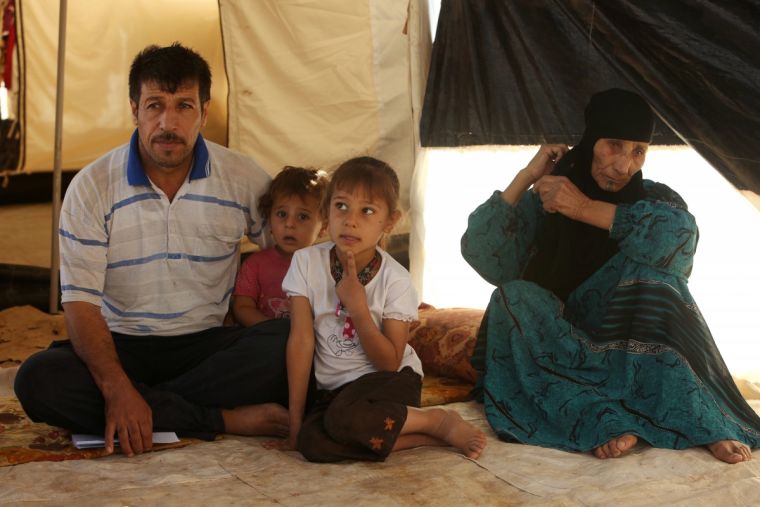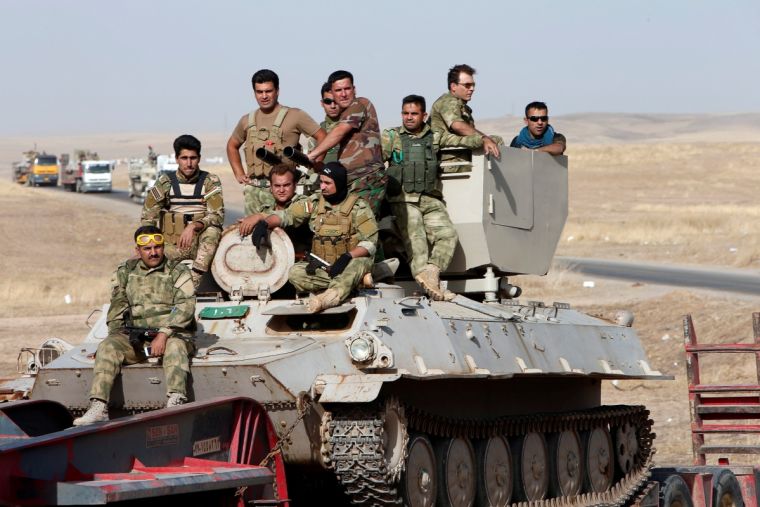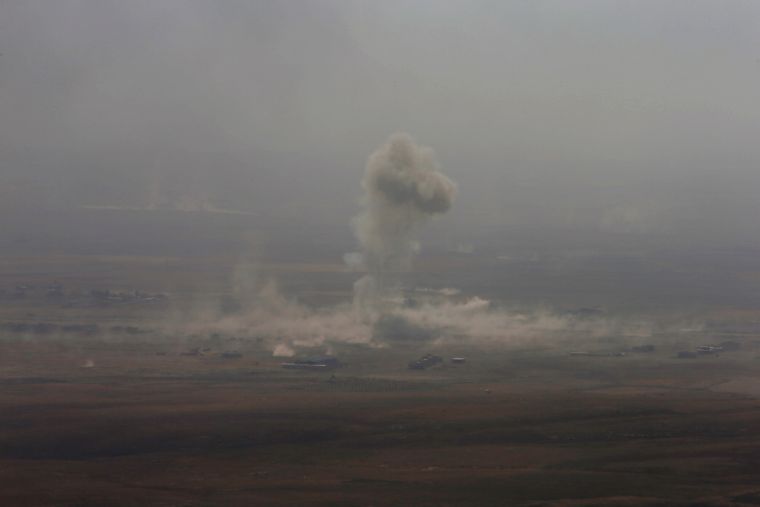
The battle to retake Mosul, a key city for Islamic State in northern Iraq and its final stronghold, has begun.
More than two years ago, on 10 June, 2014, ISIS militants swept across the Nineveh Plain and overran Mosul, a city of around three million people and once considered the heartland of Iraq's Christian population.
Upon capturing the city, militants issued an ultimatum to Christians, telling them to convert to Islam, pay a tax or flee. Those who refused to comply were killed, and there are now believed to be none left in the city. Hundreds of thousands of people fled Mosul, along with millions from the surrounding region, and they are now living in displacement camps further north, neighbouring Lebanon and Jordan, or even further afield.
In the two years since Mosul was taken, the civilians who stayed have lived under ISIS' brutal regime. Regular reports of public executions have emerged – 19 Yazidi women were reportedly set alight and burned to death in June for refusing to have sex with militants, and three imams were beheaded last December for refusing to recruit young people to the jihadi cause.
Churches have been desecrated, and even used as slaughterhouses, or to house female prisoners. The St Ephrem Syriac Orthodox Church in the city was draped with Islamic State's notorious black and white logo, with "There is no God but Allah" and "Prophet Mohammed" written on it. ISIS declared it would be reopened as a "mosque of the mujahideen".

But after more than two years of ISIS occupation, coalition forces have now begun the battle to recapture Mosul. Government troops backed by the US and other forces have launched an air and ground offensive in the biggest operation since the Iraq invasion in 2003.
"I announce today the start of the heroic operations to free you from the terror and the oppression of Daesh [ISIS]," Prime Minister Haider Abadi said on Monday.
"We will meet soon on the ground of Mosul to celebrate liberation and your salvation."
As the siege gets under way, however, aid groups have expressed deep concerns for the welfare of the children and families still living in the city.
"One million people are believed to be trapped in Mosul and expected to flee as the battle intensifies," Preemptive Love, a Christian-based charity said in the early hours of Monday morning.
The group is already giving vital aid to the thousands who have already fled the city.
World Vision is also already supporting half a million people who fled Mosul when it was first occupied two years ago. "We're now poised for another massive influx of children and families who will have been through horrific experiences most of us could never imagine," said Khalil Sleiman, World Vision's response manager for Northern Iraq.
"They will arrive with nothing but the clothes on their back and will be thirsty, hungry, and need urgent medical attention."
Specific concerns include fears for families who will be made vulnerable when fathers are separated to be screened. When Fallujah, another city that was once an ISIS stronghold, was liberated in June, Preemptive Love reported that clumps of hair could be seen lying on the ground where militants had hastily shaved off their beards in an attempt to blend in with the fleeing crowds. Detaining all men, and even teenage boys, is the only way Iraqi forces are able to work out who was affiliated with ISIS, but that leaves civilian women and children alone.
World Vision has also raised concerns that some families will have difficulty registering to get help once they have left Mosul as their identification documents were confiscated by ISIS during occupation.
"The violence will also have taken a devastating emotional toll on children, many of whom will need years of specialist support to rebuild their lives, come to terms with what happened, and to regain some kind of normality," Sleiman said.
"Children always bear the brunt of conflict and we call for humane treatment at every stage of the process of the Mosul operation – including screening when boys as young as 14 may be separated from their families."

Speaking to Christian Today, Chris Weeks, a spokesperson for World Vision based in Amman in Jordan, warned that the humanitarian situation is likely to get much worse before it can improve.
"Everyone is saying this could be the biggest humanitarian crisis of the year," he said. "If you look at the numbers, up to a million expected to flee Mosul, this will rank as the largest crisis this year."
Among those World Vision is already supporting in Iraq are Syrian refugees, displaced by war and conflict in their own country, Yazidis who fled ISIS' brutal massacre in the Sinjar region of Iraq in the summer of 2014, as well as those who have not been able to return to their homes in Mosul for more than two years. The organisation has set up Child Friendly Spaces for vulnerable minors, education centres and gives out vital emergency aid.
Teams are ready to scale up this aid in the coming days and weeks, Weeks said. "There are lots of really big questions at the moment," he added. "Like how many people will come, how soon they will come, what routes they are going to take. No one is in a position to be very precise at the moment, which is a very big challenge for us.
"As soon as they reach areas outside Mosul, we can help. We've got prepositioned supplies, and will be providing food, clean water and hygiene kits… The main thing is recognising the emotional and psychological needs of children. It's been a tough two and a quarter years of occupation under ISIL [ISIS]."
Many of the children who fled Mosul two years ago are still displaying signs of severe trauma, Weeks said. "There's no doubt it's a long process."
Dr Nezar Ismet Taib, director of health for Dohuk governate, told Christian Today that it is vital the international community help Iraq with the long-term psychological consequences of ISIS' brutal campaign. The breakdown between different communities will be difficult to rebuild, he said, and those fleeing cities like Mosul will have suffered deep trauma as a result of living under occupation.
The immediate concerns are stopping outbreaks of diseases such as measles and cholera, Dr Nezar added, and medical teams are being dispatched to the various camps to help with the demand for vaccinations. But more health centres are needed, and Iraq needs the help of international governments to cope.
Weeks and his team are also concerned about overcrowding in displacement camps, as the influx from Mosul begins. About 200 people a day are arriving in one camp not far from Erbil, and it's already struggling to cope with demand. The Iraqi government is setting up new camps for those fleeing Mosul, and aid agencies are poised to help with however many people arrive. But according to the UN's Office for the Coordination of Humanitarian Affairs in Iraq, only around 60,000 spaces are currently available in emergency sites and camps and 250,000 more are planned or under construction – nowhere near the amount needed. Dr Nezar warned that the number of people expected is likely to exceed the capacity of the camps by half, leaving hundreds of thousands of people without shelter.
As for the future of Mosul, and whether Iraq will be able to rebuild the city as place where people of different faiths can live side by side, however, Weeks is positive. "It raises more questions than answers, there will be a vacuum in the city, without question," he says.
"The only thing I can say, is that we work with most of the communities we've talked about – Yazidis, Sunni Muslims coming from Mosul, Syrian refugees. We work alongside all these people. It gives us hope."
Sponsored
Watch Your Favorite Christian Films, 24/7. Click Here To Start Your Free Trial TodayOriginal Article


